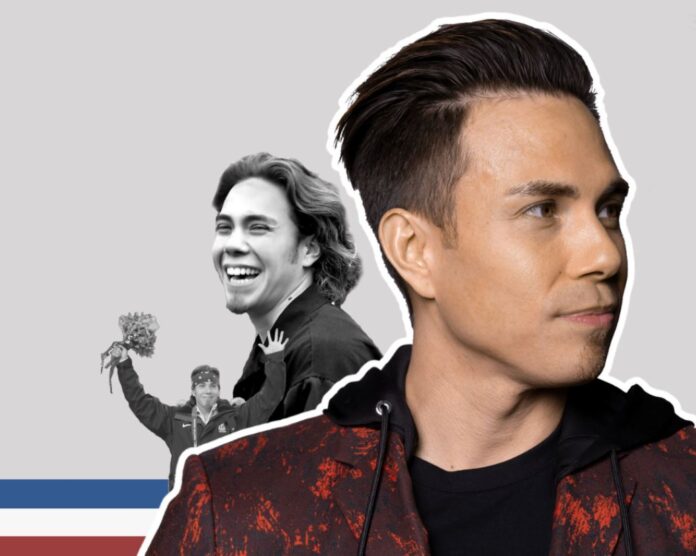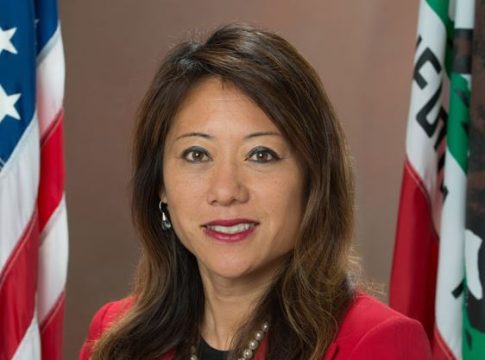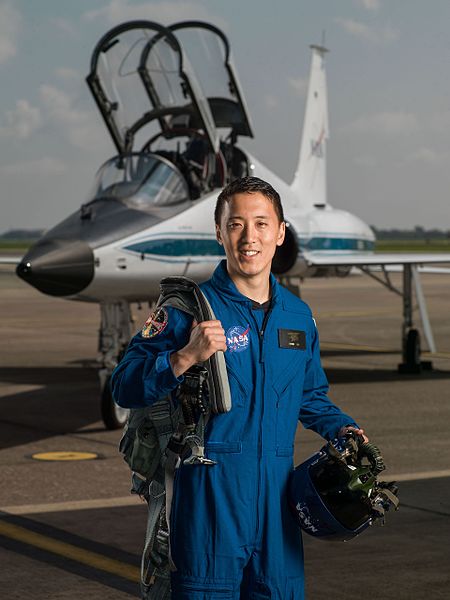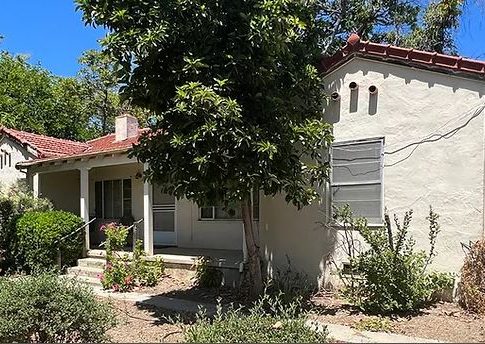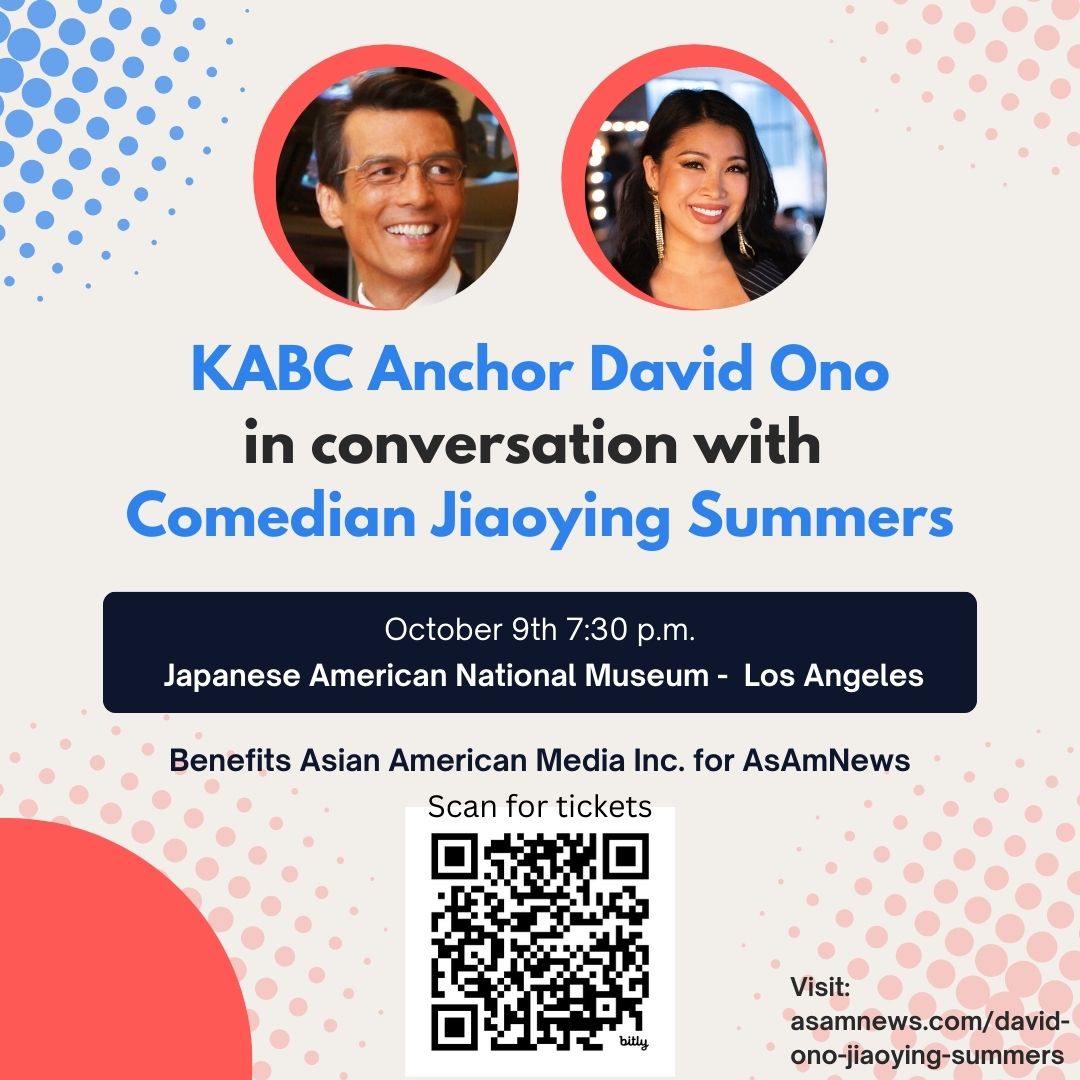By Briana Lim with graphic images by Rhiannon Koh, AsAmNews Interns
AsAmNews had the opportunity to speak with the most decorated US Winter Olympian, Apolo Ohno, on his life and career in the eleven years since his last Olympics in 2010. Apolo Anton Ohno is a retired speed skater with eight Olympic medals across three games.
Since retiring in 2010, Ohno has reinvented himself as a successful businessman, speaker, and author. He returns in 2022 with a new book, Hard Pivot, that examines how to overcome difficult transition periods.
Everyone knows you as a successful speed skater, but can you tell me what you’ve been up to since retiring as an athlete?
So man, the past eleven years have been filled with incredible experiences. I guess where we should start is when I retired in 2010. Every Olympic athlete goes through his or her reinvention or transition process. I call that process the ‘Great Divorce.’
LATEST STORIES
So when fifteen years had gone by and sport and the Olympics had shown me how to be my best, it had given me life lessons, shown me how powerful I could become, how to achieve the impossible, how to deal with loss, and how to reinvent myself
When I snapped my fingers and it was time to retire, that first true love (which was sport) looked to me and said, ‘thank you,’ but now I have someone who is younger, who is better, who’s faster, might be a better story, more attractive, and that was devastating
My friends and family had told me about the process, that it was going to happen, and that it was going to be challenging to reinvent and transition beyond, into what was going to come next for me in my own life.
Sometimes there’s a sense of a loss of purpose, I think, for many people who go through this similar experience. Olympic athletes go through that viscerally, mainly because it’s the one thing we thought was important in our life.
It’s the one thing we were given the external signal of ‘yes you are important, yes this is what you are good at, yes this is what you were put on earth to do.’ And I think what we fail to recognize, at times, is that it’s just one chapter in our lives. And a powerful chapter, at that.

So my process began being naturally curious and exploring all different types of businesses and entrepreneurship. I’ve had wins, and losses and failures and home runs, and what I can sum it down to is: it’s been an incredible display of learning.
More recently over the past three years I’ve really been focused on my own purpose. I work with a firm called ‘Tribe Capital’ out of San Francisco. They are a venture capital firm. I’m a partner in that firm. But, my real core—to be completely open and honest with you—my real love is to help people.
Yesterday, I was in Dallas, Texas, and I was speaking to a group of people. Some of them have had amazing success over the past 18 months during COVID. And some of them had to have a real different look and outlook on life, on business, on everything they create. And it’s been really, really challenging for them.
And so, that’s been hard, because these people sometimes don’t want to change. They don’t feel like they can change. They don’t know what is the best step of how to reinvent and condition their mind. In a way, they’ve been doing something their entire life and now they’re having to do something differently, or they’ll no longer be relevant in that particular business.
When I’m there and looking these people in the eye, we can talk about some of the insecurities, the self doubts that we have internally in our own experience in our own psychological process. That’s what makes me happy.
So I’ve been writing a book. The book’s called Hard Pivot it’s coming out in February during the next Winter Olympics which will be held in 2022 in Beijing. And the book is about how to reinvent, how to show up fully. How to identify what your core purpose and true North and values are in your life. And how do we embrace these things even though we know the journey is not going to be easy.
Fundamentally it’s based on something I call the five golden principles, which I bring both to my firms and to my teams today.
So the five golden principles are gratitude being number one, giving being number two, three being grit—knowing that the journey may not be easy. Four is gearing up, so how to set your personal expectations. And five is go. Sometimes we just have to go and get after it. You have to go and put your plan into place.
So someone like me, I’ve been kind of a natural self saboteur. Sometimes we get in our own ways, so to speak. We listen to the voice that says ‘you’re not good enough, you’re not smart enough, you’re not attractive enough, you’re not funny enough’— whatever it might be. There’s always that voice that holds us back. We just have to sometimes go and do it, and we learn so much by doing, and we realize that sometimes by doing an exercise called fear setting, we learn that it’s not that bad. ‘What’s the worse that could happen?’ it’s not that bad.
You mentioned how you can self sabotage. I’m curious to know: as someone who the rest of the world might see as super successful, with so many accomplishments, what would you tell your younger self? And were there any mistakes or do you have any regrets or things you would have done differently?
I wrote a book called Zero Regrets. While I think it’s fair to say when we can look back on our life, we probably had many, many regrets. And that’s fine, that’s part of the process. But it’s only true regret if we did not learn from that failure, that misstep. The beautiful thing is that the human condition has evolved and survived and thrived over millions and millions of years. It is in our DNA to actually grow. No matter what type of environmental situation we’re in. What type of calamity or chaos, or relationship, we are facing, we can come back. It is a part of who we are as human beings.
When I think about what I would tell my younger self, I’d probably say: do not be afraid to dream, do not be afraid to jump in. But also, don’t focus on the prize. Use that as a metric to guide where your eyes should be, but rather, focusing on the process is where your heart and time should be spent.
And why do I say it like that? Well, as a speedskater, what I did learn was that: if I constantly focus on ‘I gotta win gold, I gotta win gold, I gotta win gold,’ I forget about the fundamental mechanics of what I actually need to do in order to give myself the best possible chance of being my best, and even winning, being on a podium, or getting a medal.
So the metric, goal, and target, is important because it keeps you focused. But the real steps are reverse engineering that into a realm where we can say: ‘What do I need to do in year four, year three, year two, year one, month one, week one? What do I have to do today before noon so that I can get on the right track?’ And it’s that simple, that’s the beautiful thing.
So, that’s what I would tell myself: don’t forget why you are doing what you’re doing. Does this fit in the overall scope of what you deem to be valuable, and I still ask myself this question: I say what do I want from this life, this universe, and what do I believe this life, this universe wants from Apolo. And I ask myself that often. Because when it seems like we’re getting distracted, overwhelmed, or maybe lost, when I ask that, sometimes I get a little more simplistic in my thinking. And that leads me to do the things that I need to get done.
I’m curious to know how your Japanese American and multiracial background has shaped your life.
Oh it’s been really powerful. Growing up south of Seattle, I was surrounded by all different types of ethnicities, people, and friends. And my father, being a Japanese immigrant, had shown me that his hard work and determination was really inspiring. And still to this day, just imagining people who arrive in this country, not speaking the language at all and starting from scratch, with no money, no idea how the culture and society work in this country. Man, I just shake my head and I’m like, ‘dad, how did you do that?’ Arriving here with no money, no language, not knowing anyone, only having a Nikon camera around his neck, and then selling that so he could eat, and beginning his life like that is scary.
SO my upbringing was deeply rooted in a multicultural experience where because I’m HAPA—because I’m half blood—I didn’t really know who I was. I wanted to be Asian, I wanted to be sitting there with the rest of the kids from my school, I just thought I was me. I actually grew up where most of the kids were either second or third generation Chinese, Korean, of Latin descent, African American—all of my friends were of all different walks of life and experiences and so was I.
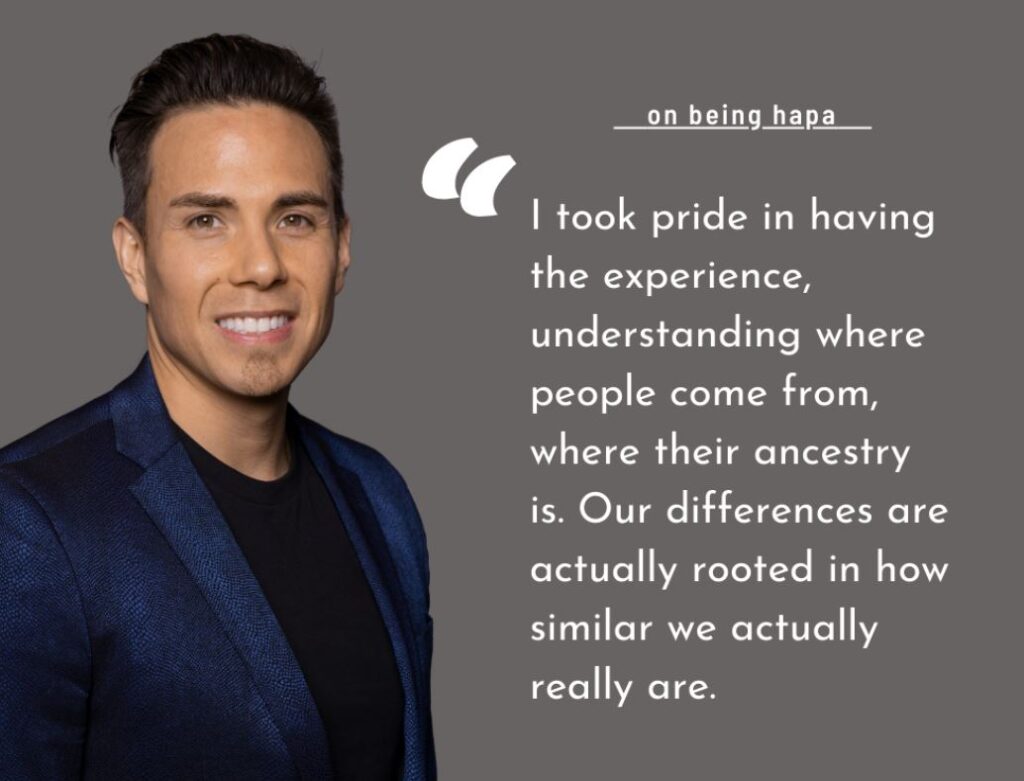
That was interesting though because I didn’t see anyone who represented me on television and sport. There was no hapa guy that I looked up to. As I grew into myself, I actually took a lot of pride. I took pride in being American, I took pride in being Asian, I took pride in being half-Japanese. I took pride in having the experience, understanding where people come from, where their ancestry is. Our differences are actually rooted in how similar we actually really are. And that was really beautiful to me.
And I don’t know if you’re like me but I love to experience different cultures through food with all my friends. Whether we were eating Korean food, eating Japanese food, eating Chinese food, eating Canto food, eating Thai food—that was my exploration into this world before I started traveling.
The heritage aspect now is really powerful, as I am part of organizations like GoldHouse, and I do a lot of work with Asian American representation in entertainment, in sport, and in business. It’s important, right? Because the so-called silent ‘model minority,’ which traditionally has been Asian American because of the culture, the heritage, the upbringings of our parents, sometimes we feel like our voice is not heard, because we haven’t said anything.
As we saw over the past several years, there’s been tremendous targeted attacks against Asian Americans. And to me, they were targeted attacks against humans. These were acts of violence that can not be accepted in our country. These were people who could not fight back, that really hurt me when I saw those videos. I had all the emotions. I was angry, I was sad, all of those things.
I would shake my head and say how have we gotten to this point. It has always been there. Then how do we change this? How do we collectively change this to create a great voice, a powerful voice that says, Hey, I am Asian, I am American, I am Asian American in this country. I contribute, I love, I support, and this is who we are. We are us, we are you, we are all connected and tied.
This miseducation, this misdirected anger and rage we aim at other people, can no longer be tolerated in this country. Against anyone who is of any experience. Any background and race.
That’s a very long answer, but I am very proud to be Asian American. I have so much respect and love to see both in entertainment and sport, more superstars coming out
My fiancé is half Chinese, half Italian, speaks fluent Chinese, full Mandarin, fluent Hokkien, fluent Italian, fluent English, which is partially why I fell in love with her because I was like, ‘wow it’s so cool to hear her speak all these different languages. Like when she speaks Cantonese with someone, she has zero accent like a person from Hong Kong. When she speaks Mandarin, they’re like, ‘I can’t believe you’re speaking Mandarin in this beautiful tone.’ When she speaks hokkien to like a taxi driver or someone like a grandma in Taiwan, they’re blown away.
I’m fascinated by the history of this world and I’m also proud. I wish I had the tongue of different languages.
I’m sure you’ve been asked this a lot, especially when you were younger, as a rising star. But even now as you’re still continuing your career, very successfully, where do you see yourself in ten or twenty years? What do you hope to accomplish?
I love this question. Aside from my personal business goals, of course that stuff is important. But my real goal is: in ten-twenty years, I want to be able to look back on the previous ten, fifteen, twenty years, and say, Apolo, you’ve done great work. You’ve given your all, and you’ve helped people, you’ve seen them grow, you nurtured people, you’ve been there when they needed you the most, and you’ve helped them realize just how powerful they are so they can tap into this untouched reservoir of potential that exists inside all of us. That’s what I want to be able to say.
My purpose and true north is aligned with helping people. Helping people do and be their best. And that’s hopefully what I’ll be able to look back on. And then obviously I want to see my family and friends be happy and healthy and living wonderful lives.
AsAmNews has Asian America in its heart. We’re an all-volunteer effort of dedicated staff and interns. Check out our new Instagram account. Go to our Twitter feed and Facebook page for more content. Please consider interning, joining our staff, or submitting a story or making a contribution.

